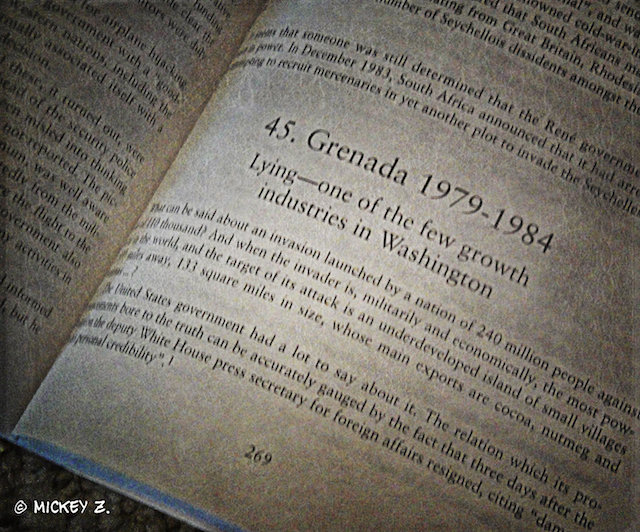31 Years After the U.S. Invasion of Grenada | Mickey Z.

Photo credit: Mickey Z.
Mickey Z. -- World News Trust
Oct. 20, 2014
As I’m sure everyone knows, we’re fast approaching the 31st anniversary of a truly momentous American victory -- a crucial military operation that not only warmed Ronald Raygun's cold, cold heart but was also deemed film-worthy by the former mayor of Carmel, California.
Yes, of course, I'm talking about the Oct. 25, 1983, "liberation" of Grenada.
Urgent Fury
In March 1979, socialist leader Maurice Bishop took over Grenada in a bloodless coup. Once deemed "a lovely piece of real estate" by U.S. Secretary of State George Shultz, Grenada is a small East Caribbean island of some 133 square miles and 110,000 inhabitants. At the time of the U.S. invasion, half of Grenada’s nationals lived in the People's Republic of Brooklyn.
The United States worked to destabilize the Bishop regime but, in early October 1983, he was ultimately deposed and later murdered by a group even more to the "Left" than he. That's when America decided to risk awakening this sleeping Caribbean giant by launching a preemptive military strike.
After adding the obligatory statements about Soviet and Cuban designs on the island, the Great Communicator sent roughly 8,000 U.S. soldiers in to lead an operation called "Urgent Fury." The fighting was over in a week. Casualties included 135 Americans killed or wounded along 84 Cubans and some 400 Grenadians dead.
MORE
http://worldnewstrust.com/a-lovely-piece-of-real-estate-31-years-after-the-u-s-invasion-of-grenada-mickey-z
malthaussen
(17,195 posts)... is that more medals were awarded than personnel participating. It's just one of those factoids that point out how silly the whole exercise was.
-- Mal
Judi Lynn
(160,530 posts)Lydia Leftcoast
(48,217 posts)I was living in Minnesota at the time, before my 19-year relocation to Oregon, and so I could compare U.S. and Canadian coverage of the Grenada invasion.
All Things Considered was reporting nothing but official military briefings. They kept saying, "We can't find out what's really going on, because we don't have access to the island."
As It Happens didn't let a little thing like that stop them. They took advantage of the fact that most Caribbean islands are on the same phone system as the U.S. and Canada, and they just phoned people in Grenada, including various consulates and even the head of the medical school.
The interview with the medical school president was most interesting. He said that the leader of the coup had phoned him, assured him that the medical students would be in no danger, that his people wanted the medical students to stay, and that here was the number he should call if any rogue rebels made trouble.
A couple of years later, Wall Street Journal reporter Jonathan Kwitny wrote a book called Endless Enemies, a critique of American foreign policy and our long-standing habit of meddling in other countries. He had a chapter about the Grenada invasion, and surprise, surprise, his account matched what I heard on the Canadian program.
In 1986 or so, I heard a lecture by a sociologist who specialized in Caribbean island societies, had visited Grenada many times, and had good friends there. Some of you may remember pictures of Grenada with graffiti saying, "Thank you, President Reagan!" and "God bless America!" Well, this sociologist was curious about the graffiti, which were all over the island, so he asked his friends who had written them, and no one knew. He then asked his friends to see if they could find out, so eventually they brought him a man who said that he had gotten up in the middle of the night to pee and had seen a van drive up to a building across the street. Some white men jumped out of the van, spray-painted the slogans, jumped back in, and drove off.
Another thing the sociologist said about Grenada was that the rebels made enemies of the U.S. by wanting to process their products (citrus fruits and spices) on the island instead of selling the raw materials to U.S. companies. He noted that an island full of orange and grapefruit trees had only imported juice for sale in its stores. That's why the "Marxists" set up a factory that made juice and candied orange peel. When the U.S. invaded, it forced the workers to leave and barred the doors and windows of the factory, leaving the fruit inside to rot. It also shut down the youth centers that were beginning to provide literacy and job training.
When the news of the Grenada invasion broke, I was an adjunct at a couple of Twin Cities colleges, including my own alma mater. I went to the campus coffee shop and spotted an elderly and respected professor of American history. I sat down with him and said, "Carl, today I'm ashamed to be American." His reply, "You and me both."
It was only the first such occasion.
Although Reagan had been harping on Grenada for a long time, the invasion took place shortly after the bombing of the Marine barracks in Lebanon, which killed over 200 Marines. Reagan was taking a lot of heat for sending the Marines over there and for not having the barracks guarded better (i.e. it was a much bigger deal than Benghazi), but then he invaded a small Caribbean island, and all the proto-freepers loved him again. (I think he took a cue from Margaret Thatcher, who boosted her own popularity by taking the Falkland Islands back after Argentina invaded them.)